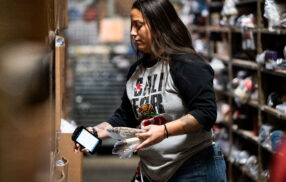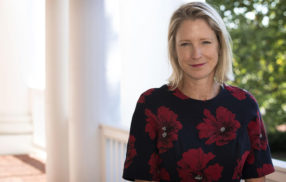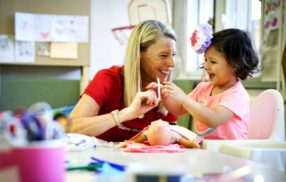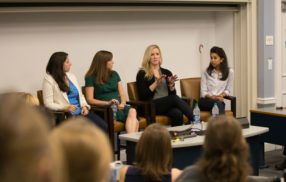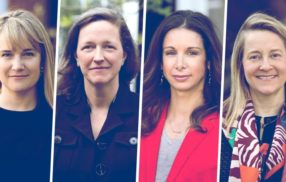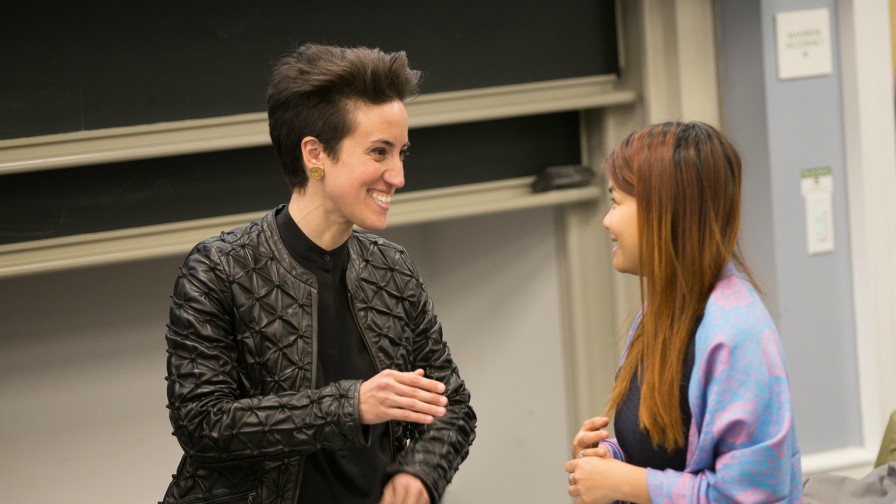
Inaugural Gender Equity Week Spotlights Momentum of Female Leadership at UVA Darden
By Dave Hendrick
The first Gender Equity Week at the University of Virginia Darden School of Business explored the role of gender in the workforce, the cultural messages directed at women and the role allies can play in supporting a healthy work environment.
The week’s events, which drew capacity crowds to a series of events and speakers, was presented by Graduate Women in Business (GWIB) at Darden.
Outgoing GWIB President Aly Yarris (Class of 2018) said the week represented an expression of concerted efforts to bring conversations about women and gender to the forefront of the Darden experience.
“GWIB is proud to celebrate the role of women at Darden and in the business community and to create spaces, such as Gender Equity Week, for us to all consider how we can work together towards a more equitable future,” said Yarris.
In one sign of gender equity at Darden, more than 50 percent of incoming club leadership at the School are women.
“It’s an exciting time to be a woman leader,” said GWIB President Jane Hannon (Class of 2019). “There is more momentum moving in that direction than there ever has been before. Women have blazed trails before us and we are now on cusp of the next breakthrough.”
Learning to Be an Ally
Two of the week’s events unpacked issues related to harassment and the #Metoo movement, as well as practical tips allies could use to support women.
Leading a session on the current #Metoo movement, Catherine Spear, UVA’s assistant vice president for equal opportunity and civil rights, offered historical context for the current culture of awareness and accountability, beginning with the naming of the phenomenon of “sexual harassment” in the 1970s and including the slow process of bringing the practice into the open in subsequent decades. Spear noted that it was not until a landmark U.S. Supreme Court decision in 1986 that sexual harassment in the workplace was deemed to violate laws against discrimination.
Spear encouraged students to consider the culture of the workplace in which they would eventually be working. If matters of gender equity are important to applicants, Spear also urged students to seek out the places that have robust policies in place and are committed to fostering a healthy work environment for all, rather than those that are simply “checking the box.”
“As you have people competing for you, you can say, ‘what are your policies on this?’” Spear said. “What sort of onboarding do you do? What are your policies on gender diversity and equity? The more people ask those questions, the more it will push a culture of change for employers.”
At a session on practical tips to be an effective ally for women, Professor Bobby Parmar hosted a troupe of actors, who, along with Darden students, role-played a number of scenarios spotlighting subtle forms of discrimination in the workplace.
While explicit harassment or discrimination is obvious, subtle harassment or undermining often takes participants to a grey area, where expectations and interpretations are less clear, Parmar said.
In addition to spotlighting troublesome workplace behavior, the participants role-played tactics to correct offensive actions.
“When we make a statement about someone’s behavior, it’s a personal thing,” Parmar said. “How can we affirm their value as a human being and simultaneously nudge the behavior in a different direction?”
Echoing a theme heard throughout the week, Parmar left Darden community members with an encouragement to try to cast off preconceptions about others and resist the temptation to slot them into existing frameworks.
As we work as casting agents in the movies of our lives, Parmar said, leaders should be aware of what role others want to play, rather than the role we might see for them.
Students Tackle Complex Issues for Women in Business and B-School
At the kickoff panel exploring the state of women students at Darden, a group of Darden student leaders discussed the benefits and complications of being a woman, as well as the intersectionality of identities with which women operate.
“Understanding those layers of different identifiers leads to different experiences in how we are treated and how structural and societal norms affect us,” said Hispanic American Network at Darden President Ximena Velez (Class of 2019). “We’re not just women — there are other layers that define us and that we identify by.”
Asked by moderator and Darden Student Association Vice President of Diversity Kimberly Diaz (Class of 2019) what gender equity at Darden might look like, the group said one of its most obvious signifiers would be a Darden student body composed of 50 percent women.
Women currently compose about 39 percent of full-time MBA students. In recent years, the proportion of women in the applicant pool for two-year programs has averaged about 38 percent, according to data from the Graduate Management Admissions Council.
Incoming Black Business Student Association President Zhana Edmonds, who spoke of the supportive environment she encountered at Darden as part of the Consortium, said sustainable gender equity would mean not just hitting a specific number of women, but making sure there was an infrastructure in place in which they could thrive.
“Gender equity needs to mean not just bringing a bunch of women here, but making sure that there is a system in place to support them while they are here,” Edmonds said. “Those two things have to happen at the same time.”
General Management and Operations (GMO) Club President Susan Isaac (Class of 2019) said an industry-wide push to admit more women to business schools could inadvertently undermine their accomplishments. She noted her irritation at being told by a well-meaning former colleague that she would have no trouble getting into an MBA program because she was a woman — as if her multiple degrees, test scores and experience as software developer counted for little.
The student panel also reached beyond Darden to share their experiences in the workforce.
Marketing Club President Mercedes Rodriguez (Class of 2019) discussed her experience in the startup space before Darden, adopting the norms of a male-centric culture where hoodies were common work attire and socializing often took the form of playing corn hole and drinking beer. Rodriguez said it was not an environment where her identity as a Latina expressed itself most fully.
On the other hand, Hannon said her pre-Darden career included a “female-forward” company led by women who were expertly navigating the responsibilities and expectations inherent in being a female leader in the corporate world. Hannon said it was important for women to be able to see themselves in role models.
Absorbing or Rejecting a Gendered Popular Culture
At a session that used the rise in gendered consumer marketing as a lens through which to view implicit — or unconscious — bias, Professor Lalin Anik said it was important to be cognizant of the preconceptions some bring to the workplace, many of which have been shaped by a gendered consumer culture.
Anik offered a timeline of major milestones in the rise of gendered marketing, the beginnings of which she pegged to around the late 1880s, including the arbitrary assignment of blue for boys and pink for girls, the rise of the notion that wearing the right clothes was key to a child’s well-being and the onslaught of consumer ads directed at children in the 1980s.
“We cannot separate marketing from the world we live in. We cannot separate it from economical decisions, political decisions or humanitarian decisions. At the end, it’s all about human behavior,” Anik said. “We have all these biases. And it’s important in these discussions to realize we are biased ourselves.”
As students, particularly future marketers, make their way in the professional world, Anik said there may be a temptation to follow the now familiar script and market to highly segmented groups in a way that confirms existing perceptions. The savvy and thoughtful marketer will look for new ways of reaching an audience, Anik said.
“Be creative in finding alternative ways to categorize the world,” Anik said. “The more data you get, the more you will be able to segment the market, but I think it’s your responsibility not to perpetuate stereotypes. Plus, binary demographics won’t be sufficient anyway.”
On a human-level, when engaged in discussions in a classroom or boardroom, Anik encouraged the students to dig into their personal well of experience when forging connections.
“You can do things in your day-to-day lives,” Anik said. “Educating people about biases goes a long way. Changing a perception is a process, not an event.”
The University of Virginia Darden School of Business prepares responsible global leaders through unparalleled transformational learning experiences. Darden’s graduate degree programs (MBA, MSBA and Ph.D.) and Executive Education & Lifelong Learning programs offered by the Darden School Foundation set the stage for a lifetime of career advancement and impact. Darden’s top-ranked faculty, renowned for teaching excellence, inspires and shapes modern business leadership worldwide through research, thought leadership and business publishing. Darden has Grounds in Charlottesville, Virginia, and the Washington, D.C., area and a global community that includes 18,000 alumni in 90 countries. Darden was established in 1955 at the University of Virginia, a top public university founded by Thomas Jefferson in 1819 in Charlottesville, Virginia.
Press Contact
Molly Mitchell
Senior Associate Director, Editorial and Media Relations
Darden School of Business
University of Virginia
MitchellM@darden.virginia.edu


